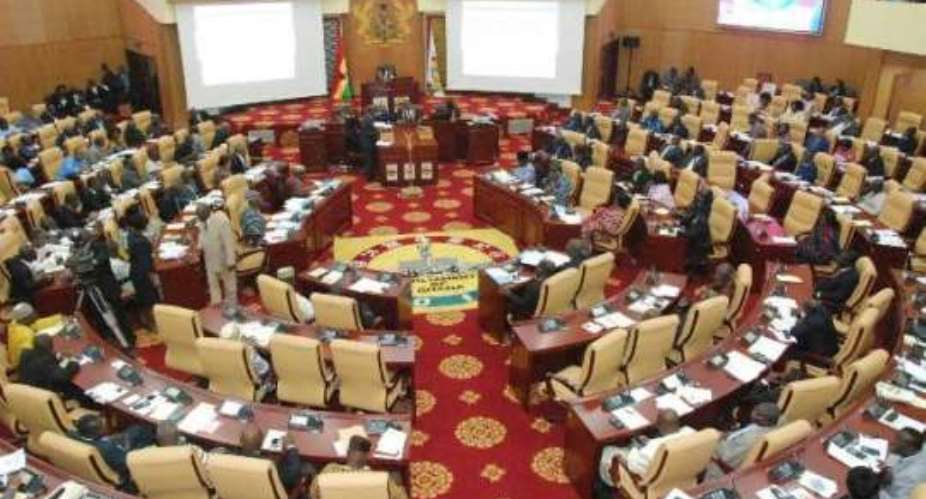Accra, Feb. 6, GNA - Parliament on Friday approved a loan of EU 13.1 from ABN AMRO N.V Bank of the Netherlands to fight the prevalence of Tuberculosis, which is currently being considered as a national security threat.
The loan would be used to implement the' accelerated Tuberculosis (TB) Case Detection Project in the country.
Tuberculosis is a contagious, highly infectious and an airborne disease which affects mostly young adults in their most economic and productive years. It has an enormous negative socio-economic impact in endemic countries including Ghana.
Moving the motion for the adoption of the Finance Committee's report for the approval of the facility, the Committee's Chairman, James Kludze Avedzi said it was estimated that 95 per cent of TB deaths occur in the developing world.
He said in 2007, it was estimated that death resulting from Tuberculosis in Ghana was over 12,000 people though TB treatment success rate has increased to 84.7 per cent for the 2007 cohort.
'If people infected with TB are detected early, the trend of TB in Ghana can be reversed. Indeed, Ghana has been cited as one of the few African countries that might attain the TB related target for the Millennium Development Goals (MDG 6, Target 3) with accelerated efforts. It is in line with this that the facility is being secured for the implementation of the 'accelerated Tuberculosis (TB) Case Detection Project in the country,' the Chairman said.
The project is to among others enhance TB control by reaching the WHO/STOP TB 70% case detection target and lower the burden of TB in the country; boost the diagnostic capacity of the public health system by distributing digital radiographic systems including teleradiology infrastructure; to replace labour intensive technologies for detecting mycobacterium tuberculosis with less labour intensive technologies such as the LED Fluorescent microscopy and molecular test units; and to boost diagnostic capacity to enhance the diagnosis of non-TB related cases like other lung diseases common among people living with HIV/AIDS, cancer, trauma and other diseases.
The total cost of the project is Twenty Million, One Hundred and Seventy -three Thousand, Two Hundred and Thirty-three Euros (Eu 20,173,233.00) is financed by the loan facility from ABN AMRO Bank N.V and supplemented with a grant amount of Seven Million, Sixty Thousand, Six Hundred and Thirty One Euros and Fifty-five Cents (Eu 7,060,631.55) from the Netherlands government through ORIO.
The facility is a mix credit facility with relatively concessionary terms. It has a grace period of 2 years and a tenor of 12 years. The interest rate is 1.95% and a grant element of 58.15%.
The Chairman noted Dr. Victor Asare Bampoe, Deputy Minister of Health's justification, in a committee's report that the project is necessary, because the country is currently facing a number of obstacles that hinder the early detection of TB cases.
Dr Bampoe noted that low sensitivity of the standard detection methodology of smear microscopy or sputum analysis; limited or no access to quality chest radiographic systems for diagnosis; high of sputum culture and limited laboratory capacity.
There is also a challenge in determining the actual prevalence of TB in the country and there was therefore a need for a nationwide survey to scientifically determine the proportion of people living with the disease which unfortunately has not been done since 1957.
The Report also indicated that the project has the capacity for revenue generation to recover its cost. The Deputy Minister told the committee that feasibility study conducted revealed the high potential of the project to generate significant revenue to repay the loan component of the facility.
The project is specifically estimated to generate an income of 18 Million Euros over the project financing period of 12 years.
GNA





 Transport fares hike: GPRTU issue two-day ultimatum
Transport fares hike: GPRTU issue two-day ultimatum
 ARC endorses Alan as presidential candidate – Buaben Asamoa
ARC endorses Alan as presidential candidate – Buaben Asamoa
 Akufo-Addo appoints Kwasi Agyei as new Controller and Accountant-General
Akufo-Addo appoints Kwasi Agyei as new Controller and Accountant-General
 PNC dismiss reports of mass resignations
PNC dismiss reports of mass resignations
 PAC advocates for revenue collectors to be engaged on commission basis, not full...
PAC advocates for revenue collectors to be engaged on commission basis, not full...
 Akufo-Addo commissions Kumasi 1 Thermal Power Plant
Akufo-Addo commissions Kumasi 1 Thermal Power Plant
 Genser Energy commissions 110km of natural gas pipeline at Anwomaso
Genser Energy commissions 110km of natural gas pipeline at Anwomaso
 Naa Torshie calls for tolerance, peace ahead of 2024 election
Naa Torshie calls for tolerance, peace ahead of 2024 election
 Asantehene commends Matthew Opoku Prempeh for conceiving GENSER Kumasi Pipeline ...
Asantehene commends Matthew Opoku Prempeh for conceiving GENSER Kumasi Pipeline ...
 Let’s do away with ‘slash and burn politics’ in Ghana — Dr Adutwum
Let’s do away with ‘slash and burn politics’ in Ghana — Dr Adutwum
